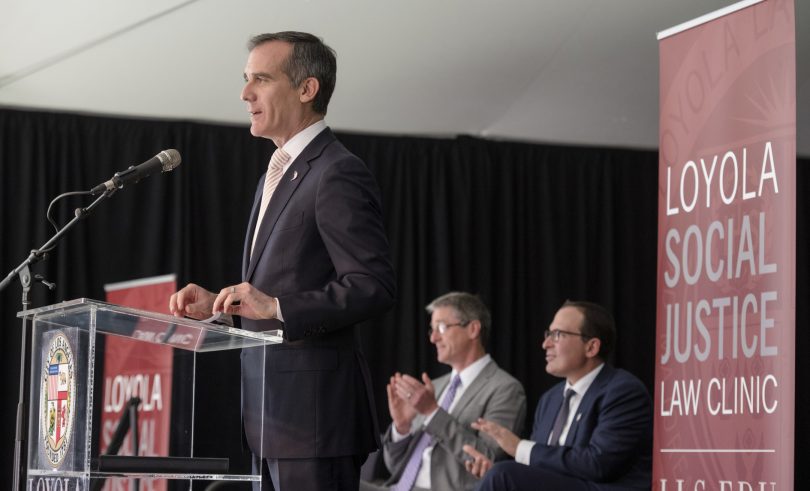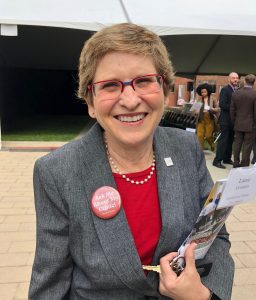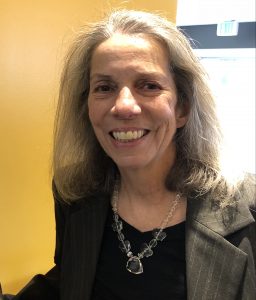“The moments when people need us the most are the moments when we have to be found,” said Los Angeles Mayor Eric Garcetti last Wednesday afternoon to a crowd of lawyers, judges, law students, and others who had gathered in a large courtyard at the bright-colored Frank Gehry-designed Loyola Law School campus.
“Today we’re offering a [helping] hand to our fellow human beings and saying, ‘We will be there for you,'” Garcetti said to the crowd.
The mayor was at Loyola to celebrate the official opening of the school’s newest social justice law clinic, called the Collateral Consequences of Conviction Justice Project.
This particular clinic, which has actually been up and running for a few months, offers legal assistance to those Los Angeles residents with past criminal justice involvement who need help overcoming such problems as denial of licenses needed for jobs, the loss of the right to vote, denial of housing and, most often, difficulties in getting employment.
Garcetti’s office is partnering with the law school to fund the new clinic, which he has nicknamed “Triple C.” to get around its alliterative multi-syllabic moniker.
“‘Triple C’ is our mission,” Garcetti said, and the crowd applauded in agreement.
Getting a job, or a better job
Triple C” is the latest of the group of clinics that operate under the larger umbrella of Loyola’s Social Justice Law Clinic.
Some of those clinics include the Project for the Innocent led by attorney Laurie Levenson, the Center for Juvenile Law & Policy, led by former federal defense attorney, Sean Kennedy, plus an Immigrant Justice Clinic, and a newly-funded clinic to help foster care kids who are also struggling with the juvenile justice system, a project that WitnessLA wrote about in December.
And there’s an impressive list after that.
Whatever its emphasis, each clinic features a supervising attorney, or attorneys, who guide a group of Loyola law students through the process of aiding the various clinics’ clients.
The supervising attorney for this newest addition to the school’s respected group of specialized legal clinics, is attorney Elie Miller. Miller began her career as a Los Angeles County deputy public defender for 19 years. Then, after retiring from county work, she offered her legal expertise to an impressive line-up of non-profits. She was, for example, the Director of Legal Services at Homeboy Industries, and then worked with Pepperdine Law School’s Legal Aid Clinic, which served homeless clients at the Union Rescue Mission. Miller also served as staff attorney for Susan Burton’s A New Way of Life Reentry Project, which helps women who are working to get on their feet after returning from prison.
Now as director of the Collateral Consequences of Conviction Justice Project, she is back working with law students, which Miller clear enjoys.
“The most requested remedy that people who come to us are looking for, said Miller when we asked, “is expungement.” This means the clients have misdemeanor or felony convictions for which they got probation, but no jail or prison time. “Excluding a few sex offenders,” she said, in many cases, those convictions can be expunged.
When asked for an example of the effect of an expungement, Miller recalled a particular client from her Homeboy Industries years. “The guy had three misdemeanor convictions that he wanted expunged,” she said. Miller was able to help him, but never heard from the man again.
Then eight months later, she said, she got a voicemail, and it was the same guy.
“He said, ‘I wanted you to know I’ve got a job driving a bus for the MTA.'” It was all possible, the man said, “because you helped me expunge my record.”
These convictions were in the man’s past, said Miller, and he was married with young children, “and MTA hires people if their convictions are expunged.”
The man was ready to make a new life for himself and his family, said Miller. He just needed some legal help to do it.
She said her new Loyola clinic also works with people who are eligible for a charge reduction because of Prop. 47, making them subsequently eligible for expungement.
A mistake reversed
Miller also values the clinic work because of the opportunities it gives interested Loyola law students.
Miller told of recently coaching a student through representing a woman who was in prison on a minor probation violation, after being convicted on a marijuana sales charge. But–post Prop. 64, the marijuana initiative–Miller explained, the woman was eligible for release “on time served.”
In looking into her case, Miller and the student she’d assigned the case found that the previous attorney who had represented the woman had apparently “completely missed” that the locked-up mother with two children was “Prop. 64 eligible.”
The woman heard about Miller’s work when the attorney was still at A New Way of Life, which, as its name suggests, helps incarcerated women restart their lives, and wrote to ask for help. Miller and her student crew were then able to pick up the case at Loyola.
“So, now she’s out.”
The law student who worked on the case was elated at the outcome she’d accomplished, Miller said. The same law student worked on another case, this time an expungement, this past January.
“She did the hearing, and the expungement was granted.” The experience of making a measurable difference in a client’s life is often a formative one for students, according to Miller.
In order to be able to participate in Loyola’s various social justice clinics, students must apply to the state bar, and become a “certified law student,” Miller explained.
“We give the students the opportunity to do real work—under supervision, of course. But that’s what law school should be about.”
Getting jobs “with a future”
Some people whom Miller and her students help, already have a job. “But they want to get a better job. They want to move on further with their life.”
The clinic has one client, Miller said, who is finishing up getting his diploma. Right now, he has a job working for an auto repair shop, she said, “but he wants to go into aerospace.” And for that, he needs an expungement.
“People who come to us tell me, they don’t just want jobs, they want a career,” Miller said. “They want a job with benefits. They want to pay their taxes. But so many of these jobs that are minimum wage, they have no future.”
Thus to reach for that better future, people call her clinic for legal help.
In the nine months it has been open, Miller’s “Triple C” project has provided advice and direct representation on 221 matters, Mayor Garcetti noted in his speech.
That’s 24 cases and/or clients a month. And Miller and her crew are just gearing up.
LA as the land of second chances.
The idea of the second chances that Elie Miller’s clinic provides “isn’t an abstraction” for him, Garcetti told the crowd near the end of his speech. As an example, he talked about his “Grampa Sal,” with whom he and his sister would spend weekends in the San Fernando Valley, he said.
One time, as the mayor tells it, young Eric was watching television with his grandfather. “And there was a picture on television of a very distinguished man. And my grandfather said, ‘Eric, I know him. He’s the mayor of Los Angeles, Tom Bradley.'”
Garcetti said he was proud of his immigrant grandfather who got in trouble as a youth, and never graduated from junior high school, but then eventually got his citizenship “by fighting for this country in World War II.” After the war, Sal became a barber. Then he “saved up his pennies and he and my grandmother opened a barbershop in South LA.”
And, here he was telling his grandson he knew the mayor.
“I said, ‘How do you know him, Grandpa?’ Garcetti continued.
“He said ‘When I was younger and he was younger, he arrested me!’”
The lawyerly crowd laughed, of course.
“But then he turned his life around, because he was given an opportunity.”
Which brought Garcetti back to Elie Miller’s Triple C project.
By providing the legal services “that their clients need so badly but cannot afford, the students and the staff working in this clinic are the change makers this city so badly needs,” continued the mayor, winding up for a close, but with an enthusiasm that appeared genuine.
“They’re creating hope and allowing it to root here in this fertile ground. And in doing so they’re making this city safer, and they are making it more just.”
The otherwise dignified crowd applauded enthusiastically in response, with the various clinics’ law students scattered through the audience looking the most enthusiastic of all.
Photo of Mayor Garcetti by Kim Fox/Loyola Law School. Photos of Laurie Levenson and Elie Miller, by WitnessLA




What a group of MORONS! The city is literally wallowing in feces and squalor and this is where Garcetti puts his efforts? Sad!
Says the conservative white nationslist. Go comment a fox news blog. Yea why not give a person a second chance as opposed to leaving open the revolving door thats called state prison. F’n peice of dogg ish…Ppl like you and your mindstate are the exact reason LE needs a complete overhaul. And its coming ohhhh its coming : )
Hi, I’m contacting you on behalf of my son Dameian Rodgers. I’ve contacted university multiple times, leaving multiple messages and all I was told is have your son call me. My son Dameian was sentenced as an adult at 17 years of age. He’s still incarcerated. He is special needs since 15 months old. I inquired about his ability to understand what he pled guilty to. I’m desperately seeking help to get him released through post Conviction Release, if eligible. I need help with this. Thank you